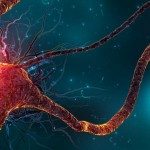Présentation
Mutations in the gene encoding Vlgr1 (Very large G-coupled Receptor protein 1) areresponsible for Usher Syndrome type 2C (USH2C). This autosomal recessive syndrome is characterized by congenital, moderate to severe hearing impairment and a retinitis pigmentosa in the second decade of life. In addition to their deafness, knock-out mice for Vlgr1 (Vlgr1-/- mice) suffer from audiogenic seizures that are classified as reflex seizures. Reflex seizures denote seizures that can be induced repetitively by a ‘precipitating’ stimulus alone, and concern up to 7% of patients suffering from epileptic and related disorders. In Vlgr1-/-mice, these seizures can be induced by exposing them to a loud sound (95dB) and are characterized by wild running of the mouse followed by convulsions that may lead to death. The initiation site of these audiogenic seizures, as well as the cellular and molecular mechanisms involved, are poorly understood.
The project aims to answer the three following questions:
1) Where is the initiation site of audiogenic seizures in Vlgr1-/- mice?
2) What is the link between absence of Vlgr1 expression and the audiogenic seizures?
3) What are the cellular and molecular mechanisms responsible for the audiogenic seizures?


